Health Alerts
HEALTH ALERTS:
As health alerts are issued, they will be posted here.
Information on some of the more common health related issues can be found below.
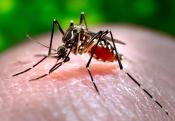
Three Mosquito Transmitted Diseases in New Hampshire
Mosquito borne illnesses have recently been detected in humans in New Hampshire. There are simple steps each of us can take to reduce our chances of beng exposed to these illnesses.
1. Eliminate standing water and other mosquito breeding locations.
In warm weather, mosquitoes can breed in any puddle that lasts more than 4 days!
- Remove old tires from your property.
- Dispose of tin cans, plastic containers, ceramic pots, or other containers. Don't overlook containers that have become overgrown by aquatic vegetation.
- Drill holes in the bottom of recycling containers that are left outside.
- Make sure roof gutters are clean and draining properly.
- Clean and chlorinate swimming pools and hot tubs. If not in use, keep empty and covered and keep covers free of standing water.
- Aerate garden ponds or stock them with fish.
- Turn over wheelbarrows and change water in birdbaths at least twice weekly.
- Turn over plastic wading pools when not in use.
- Remind or help neighbors to eliminate breeding sites on their properties.
2. Be aware of where mosquitoes live and breed, and keep them from entering your home.
- Mosquitoes lay their eggs in standing water. Weeds, tall grass, and bushes provide an outdoor home for the adult Culex pipiens mosquito (the common northern house mosquito), which is most commonly associated with the West Nile Virus.
- Mosquitoes can enter homes through windows or doors with broken or no screens. Make sure doors and windows have tight-fitting screens. Repair or replace all screens in your home with tears or holes.
- Resting mosquitoes can often be flushed from indoor resting sites by using sweeping motions under beds, behind bedside tables etc. and once in flight, killed prior to sleeping at night.
3. Protect yourself from mosquito bites.
- If outside during evening, nighttime, and dawn hours, when mosquitoes are most active and likely to bite, children and adults should wear protective clothing such as long pants, long-sleeved shirts, and socks.
- Consider the use of an effective insect repellent, such as one containing DEET.
- Repellent containing 30% or less DEET (N,N-diethyl-methyl-meta-toluamide) are advised for use by children and adults.
- Use DEET according to the manufacturer's directions.
- Children should not apply DEET to themselves.
- Repellents that contain Picaridin or oil of lemon eucalyptus have also been determined to be useful.
- Vitamin B, ultrasonic devices, incense, and bug zappers have not been shown to be useful in preventing mosquito bites.
Please visit NH DHHS Mosquito Borne Illnesses for more information
Eastern Equine Encephalitis (EEE) - FACT SHEET
To view the fact sheet, click HERE
West Nile Virus (WNV) - FACT SHEET
To view the fact sheet, click HERE
Jamestown Canyon Virus (JCV) - FACT SHEET
To view the fact sheet, click HERE
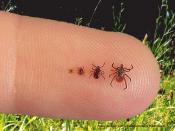
Four Tick Transmitted Diseases in New Hampshire
Lyme and other tickborne diseases are spread to humans and animals by the bite of an infected tick. In New Hampshire, Lyme disease is the most commonly reported tickborne disease.
Please refer to the following links for additional information:
- Tick Bite Facts: https://www.dhhs.nh.gov/sites/g/files/ehbemt476/files/documents/2021-11/tickbitesFS.pdf
- Removing a tick (video): https://www.youtube.com/watch?v=oGrK4ZKUfhQ
- Lyme Disease Fact Sheet: https://www.dhhs.nh.gov/sites/g/files/ehbemt476/files/documents/2021-12/lymefs.pdf
- CDC - Ticks: https://www.cdc.gov/ticks/index.html

Difference Between Flu and COVID-19
Please view the following link: https://www.cdc.gov/flu/symptoms/flu-vs-covid19.htm
Flu Season
Anyone can get the flu, but those younger than 5 years of age or older than 65 are at a higher risk of additional complications like pneumonia.
Getting a flu vaccine will not protect against COVID-19, however flu vaccination has many other important benefits. Flu vaccines have been shown to reduce the risk of flu illness, hospitalization and death. Getting a flu vaccine this fall will be more important than ever, not only to reduce your risk from flu but also to help conserve potentially scarce health care resources.
Although not everyone who has the flu will have a fever, symptoms usually come on suddenly and people who have the flu will often feel some or all of these symptoms:
- Fever
- Cough
- Sore Throat
- Runny or Stuffy Nose
- Body Aches
- Headache
- Chills
- Fatigue
- Sometimes diarrhea and vomiting
Talk with your doctor to see which vaccine is right for you.
It is never too late in the season to get a flu shot. Flu vaccines and COVID-19 vaccines can be given at the same time.
For Questions & Answers about the Flu and COVID-19, please see the link below:
https://www.cdc.gov/respiratory-viruses/index.html
NH COVID-19 RESPONSE: https://www.covid19.nh.gov/
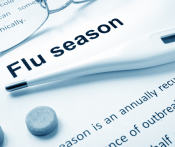
PROTECT YOURSELF!
- Wash your hands often with soap and water for at least 20 seconds. Use an alcohol-based hand sanitizer if soap and water are not available.
- Avoid touching your eyes, nose, or mouth.
- Avoid close contact with people who are sick.
- Stay home when you are sick.
- Cover your cough or sneeze with a tissue, then throw the tissue in the trash.
- Clean and disinfect frequently touched objects and surfaces using a regular household cleaning spray or wipe.
- Practice other good health habits. Get plenty of sleep, be physically active, manage your stress, drink plenty of fluids, and eat nutritious food.
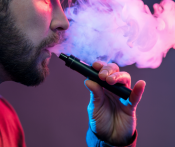
National Investigation into Unexplained Vaping-Associated Pulmonary Illness
According to the Centers for Disease Control and Prevention (CDC), as of February 18, 2020, 2,807 cases of e-cigarette, or vaping product use associated lung injury (EVALI) have been reported to CDC from 50 states. Sixty eight deaths in 29 states are reported. The median age of deceased patients was 49.5 years and ranged from 15 to 75 years. More deaths are currently under investigation.
Among 2,668 patients with data, 76% of patients are under 35 years old. 37% of patients are 18 to 24 years old and 24% of patients are 25 to 34 years old. Among 2,022 patients with information on substances used in e-cigarette, or vaping, products in the 3 months prior to symptom onset, about 82% reported using THC-containing products and about 57% reported using nicotine-containing products.
What is New?
Recent CDC laboratory testing of bronchoalveolar lavage (BAL) fluid samples (or samples of fluid collected from the lungs) from 29 patients with EVALI submitted to CDC from 10 states found vitamin E acetate in all of the BAL fluid samples. Vitamin E acetate is used as an additive in the production of e-cigarette, or vaping, products. This is the first time that we have detected a potential chemical of concern in biologic samples from patients with these lung injuries.
CDC continues to recommend that people should not use e-cigarette, or vaping, products that contain THC, particularly from informal sources like friends, or family, or in-person or online dealers. We will continue to provide updates as more data become available.
E-cigarette Use Among Middle and High School Students — United States, 2020
The use of any tobacco product by youths is unsafe, including electronic cigarettes (e-cigarettes) (1). Most e-cigarettes contain nicotine, which is highly addictive, can harm the developing adolescent brain, and can increase risk for future addiction to other drugs (1). E-cigarette use has increased considerably among U.S. youths since 2011 (1,2). Multiple factors have contributed to this increase, including youth-appealing flavors and product innovations (1–3). Amid the widespread use of e-cigarettes and popularity of certain products among youths, on February 6, 2020, the Food and Drug Administration (FDA) implemented a policy prioritizing enforcement against the manufacture, distribution, and sale of certain unauthorized flavored prefilled pod or cartridge-based e-cigarettes (excluding tobacco or menthol). During September 2014–May 2020, e-cigarette sales increased by 122.2%.
In 2020, 19.6% of high school students (3.02 million) and 4.7% of middle school students (550,000) reported current e-cigarette use. Among current e-cigarette users, 38.9% of high school students and 20.0% of middle school students reported using e-cigarettes on 20 or more of the past 30 days; 22.5% of high school users and 9.4% of middle school users reported daily use. Among all current e-cigarette users, 82.9% used flavored e-cigarettes, including 84.7% of high school users (2.53 million) and 73.9% of middle school users (400,000).
For additional information:
- What are E-Cigarettes? https://www.cdc.gov/tobacco/basic_information/e-cigarettes/pdfs/ecigarette-or-vaping-products-visual-dictionary-508.pdf
- CDS Smoking & tobacco Use: https://www.cdc.gov/tobacco
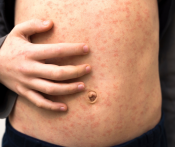
Measles
Measles is a vaccine-preventable communicable disease.
Measles is a reportable disease in New Hampshire to the NH Department of Health & Human Services at 603-271-4496. Ensure you are vaccinated against measles before traveling internationally. This highly contagious virus can live for 2 hours in the air where an infected person was.
View the NH Dept of Health & Human Service Fact Sheet:
To view the fact sheet, click HERE
Information on the CDC Vaccination Recommendations:
- https://www.cdc.gov/vaccines/vpd/measles/index.html
- https://www.cdc.gov/measles/plan-for-travel.html

Hepatitis A
Hepatitis A is a vaccine-preventable communicable disease.
View the NH Department of Health & Human Services Fact Sheet
To view the fact sheet, click HERE
Learn more about Hepatitis A: https://www.cdc.gov/hepatitis-a/index.html

